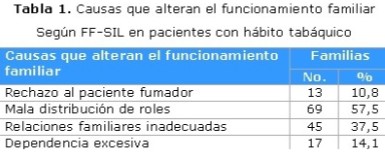Funcionamiento familiar en pacientes con hábito tabáquico
Palabras clave:
TABAQUISMO, RELACIONES FAMILIARES, ESTILO DE VIDA, PACIENTES, HÁBITO.Resumen
RESUMENFundamento: el hábito tabáquico constituye una de las principales causas de morbilidad y mortalidad lo que lo hace ser, sin lugar a dudas, un problema de salud. Este hábito es capaz de afectar el funcionamiento adecuado y normal de la familia.
Objetivo: caracterizar el funcionamiento familiar en pacientes con hábito tabáquico.
Métodos: se realizó un estudio descriptivo prospectivo en 120 individuos con hábito tabáquico seleccionados al azar pertenecientes al consultorio médico número 9 del Policlínico Docente Raúl Sánchez Rodríguez de la provincia de Pinar del Río, en el período comprendido entre abril y junio de 2015. Se estudiaron las siguientes variables: causas que alteran el funcionamiento familiar, consecuencias del hábito tabáquico y principales crisis paranormativas. Se respetó la ética médica.
Resultados: dentro de las alteraciones del funcionamiento familiar resaltaron la mala distribución de roles (57, 5 %) y las relaciones familiares inadecuadas (37, 5 %). La inadecuada distribución del per cápita familiar (59, 1 %) y la desatención familiar (20, 8 %) fueron las consecuencias más frecuentes. La crisis paranormativa predominante en familias de pacientes con hábito tabáquico fue la desorganización (39, 1 %).
Conclusiones: el funcionamiento familiar en pacientes con hábito tabáquico presentó alteraciones como la mala distribución de roles, las relaciones familiares inadecuadas, la mala distribución del per cápita familiar, la desatención familiar y la desorganización como principal crisis paranormativa, por lo que es importante la intervención educativa para revertir positivamente dicha situación.
Background: smoking is one of the main causes of morbidity and mortality and thus, without any questions, a health problem. This habit is able to affect the appropriate and normal family functioning.
Objective: to characterize the family functioning of patients with smoking habits.
Methods: a descriptive, prospective study was conducted from April to June, 2015 in 120 patients with smoking habits, chosen at random and treated in the family physician’ s office number 9 of Raúl Sánchez Rodríguez Policlinic in Pinar del Río. The following variables were studied: causes that affected the family functioning, consequences of the smoking habit, and the main paranormative crisis.
Results: among the problems that affected the family functioning were the wrong role distribution (57, 5 %) and the inappropriate family relationship (37, 5 %). The inappropriate per capita distribution in the family (59, 1%) and the family neglect (20, 8 %) were the most frequent consequences. Lack of organization (39, 1 %) was the most predominant paranormative crisis in families with patients with smoking habits.
Conclusions: there were some problems that affected the family functioning of patients with smoking habits like the wrong role distribution, the inappropriate family relationship, the wrong per capita distribution in the family, family neglect, and the lack of organization as the main paranormative crisis. Therefore, it is important to revert positively the situation by means of an educative intervention.
Descargas

Descargas
Publicado
Cómo citar
Número
Sección
Licencia
La Revista Archivo Medico Camagüey, ofrece de forma inmediata después de ser indexada en el Proyecto SciELO; acceso abierto al texto completo de los artículos bajo el principio de hacer disponible y gratuita la investigación para favorecer el intercambio del conocimiento global y coadyuvar a una mayor extensión, publicación, evaluación y uso extensivo de los artículos que se exponen pudiendo ser utilizados, sin fines comerciales, siempre y cuando se haga referencia a la fuente primaria.
Carta De Declaración De Autoría u Derechos De Autor(a)
Conflictos de intereses: los autores deberán declarar de forma obligatoria la presencia o no de conflictos de intereses en relación con la investigación presentada. (Descargar Plantilla para declarar confictos de intereses)
La Revista Archivo Médico Camagüey se encuentra bajo una
Licencia Creative Commons Reconocimiento-NoComercial 4.0 International (CC BY NC 4.0).
Esta licencia permite a otros distribuir, mezclar, ajustar y construir a partir de su obra, incluso con fines comerciales, siempre que le sea reconocida la autoría de la creación original. Esta es la licencia más servicial de las ofrecidas. Recomendada para una máxima difusión y utilización de los materiales sujetos a la licencia. La licencia completa puede consultarse en: https://creativecommons.org/licenses/












